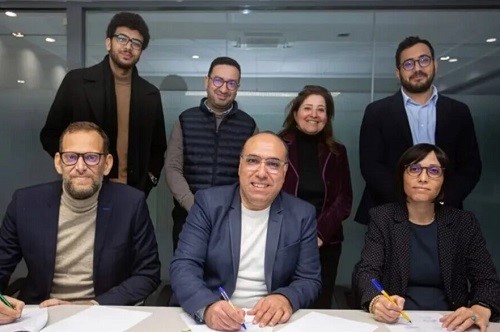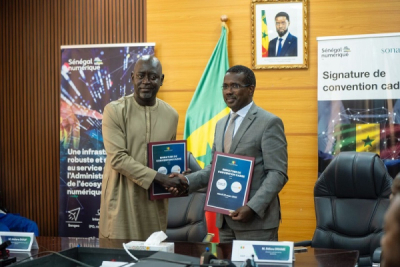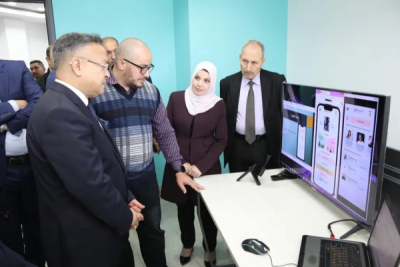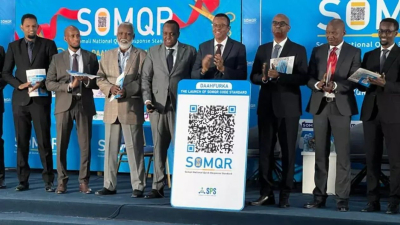Senegal aims to become a leading tech hub in Africa by 2034. To bring this vision to life, the government is strengthening strategic partnerships with key players to fast-track its digital transformation.
The Senegalese government is considering a collaboration with Chinese technology firm Huawei to bolster its digital transformation strategy and modernization projects, officials said on Wednesday.
The potential partnership was discussed during a meeting on Tuesday, March 25, between Alioune Sall, Senegal's Minister of Communication, Telecommunications and Digital Affairs, and Shen Li, President of Huawei for West, North and Central Africa.
Discussions during the meeting centered on various aspects of Senegal's digital overhaul, including enhancing connectivity through high-speed networks, deploying 5G technology, and establishing digital platforms and sovereign cloud services. Digital inclusion was also a key topic, with a proposal to make smartphones available for as low as 8,000 West African CFA francs (around $14) to broaden access to connectivity for all Senegalese citizens.
Huawei emphasized its commitment to accelerating the digitization of public services and modernizing the country's digital infrastructure, while also expressing its intent to work with the local private sector to support this initiative.
The meeting is part of the Technological New Deal, a strategic program that outlines Senegal's new digital vision. The plan aims to structure the digital sector and centralize technology governance to improve the efficiency of public services and foster an inclusive digital transition. Key objectives of the program include digitizing 90% of public services by 2034, training 100,000 digital experts, creating tech centers of excellence, and ensuring the security of sensitive data within Senegal.
Huawei already has a significant presence in Senegal, having contributed to major projects in the telecommunications sector and in the training of local information technology talent. This recent meeting signals a potential for stronger collaboration and joint initiatives to support the country's economic growth, particularly through the successful implementation of the New Deal for Technology
By Samira Njoya,
Editing by Sèna D. B. de Sodji
Lagos, one of Africa’s fastest-growing megacities, is notorious for heavy traffic congestion and road safety challenges. Introducing e-police and speed limit cameras is a critical step toward improving road safety, reducing accidents, and enforcing traffic laws more effectively.
The Lagos State Government has announced plans to install 3,000 e-police and speed limit cameras across the state to enhance traffic law enforcement and improve road safety. The Director of the Lagos State Vehicle Inspection Service (VIS), Engr. Akin-George Fashola disclosed this on March 25 during a discussion on Lagos Transport Trends and Perspectives, a program sponsored by the State’s Ministry of Transportation on Traffic Radio 96.1 FM.
According to Engr. Fashola, speed limit cameras have already been installed at key locations such as Alapere-Ogudu Road, where the speed limit is 80km/h inbound Alausa and 60km/h inbound Iyana Oworo, and Mobolaji Bank Anthony Way, which has a 60km/h limit. Meanwhile, e-police cameras are operational at Allen Junction and Nurudeen Olowopopo Road in Ikeja to monitor red light violations and other infractions.
The penalty for violating speed limits has been set at ₦50,000 ($32.5), though offenders who believe they were wrongly fined can contest the charge by providing proof. Engr. Fashola clarified that the initiative applies to all road users, including commercial vehicle operators.
In Q3 2023, the National Bureau of Statistics reported that speeding was responsible for 56% of road accidents in Nigeria, making it the leading cause of traffic fatalities. The high rate of accidents caused by speeding underscores the urgent need for stricter traffic enforcement measures. By leveraging technology to monitor and penalize traffic violations, authorities can enhance road safety, reduce fatalities, and promote compliance with speed limits.
Hikmatu Bilali
Sonatel has been driving Senegal’s digital transformation for several years. Following a recent agreement between its foundation and the Ministry of National Education, the group is now partnering with another state institution.
Sénégal Numérique (SENUM SA) and Sonatel, the owner of telecom operator Orange, announced a partnership agreement on Tuesday, March 25, to support Senegal's digital transformation. The two entities will combine their resources and expertise to develop innovative digital services and improve connectivity nationwide.
"This collaboration aims to accelerate Senegal's digital transformation by focusing on four key areas: strengthening infrastructure for reliable connectivity, developing sovereign cloud and data center solutions, digitalizing public services, and supporting innovation and citizen training," the group stated.
According to details shared on national television (RTS), the agreement includes interconnecting the two entities’ submarine cables to enhance the resilience of digital infrastructure; reactivating the SENIX internet exchange point to improve data traffic management and bolster digital sovereignty; and interconnecting the Sénégal Services and Orange Digital Service hubs to improve access to both public and private digital services. It also includes the implementation of an e-certification system to ensure traceability and compliance in environmental initiatives.
The partnership is part of Senegal’s new digital strategy, which aims to modernize public administration, strengthen digital sovereignty, and promote digital inclusion. It seeks to address challenges related to connectivity and access to digital services, which are essential for economic and social development.
The success of the partnership will depend on the concrete implementation of the planned initiatives. Challenges remain, particularly regarding infrastructure, digital skills training, and network coverage in rural areas. Regulation and governance of this public-private partnership could also present issues.
In the long run, this collaboration could foster the emergence of a dynamic digital ecosystem in Senegal, attract investment, and boost the country’s competitiveness in the tech sector.
By Adoni Conrad Quenum,
Editing by Feriol Bewa
Benue State, like the federal government, is emphasizing digital transformation. To this end, the state entered into a partnership with Huawei in November 2024.
Benue State announced this week that it is committing to training 40,000 civil servants in digital tools and ICT skills. The Nigerian Data Protection Commission (NDPC) will be among the entities providing part of this training.
The program aims to equip civil servants with the skills to effectively utilize the platforms implemented by the state government to support its digital transformation efforts. These solutions include an electronic document management system, a geographic information portal, a start-up support platform, and a dedicated website for the Office of the Head of Service of the State.
"Through this training, we are fostering a future-ready workforce capable of adapting to the demands of a rapidly evolving world," said Hyacinth Iormem Alia, Governor of Benue State. This perspective is also supported by the Organisation for Economic Co-operation and Development (OECD), which shares this vision in its recommendations.
In its report titled "Developing skills for digital government: A review of good practices across OECD governments," the organization states that “to support the shift to digital government, countries must invest in developing the skills of civil servants.”
The OECD further notes that digital technologies have had—and will continue to have—a profound impact on economies, labor markets, and societies. This trend is echoed by the World Bank, which forecasts that nearly 230 million jobs in Sub-Saharan Africa will require digital skills by 2030.
By Isaac K. Kassouwi,
Editing by Sèna D. B. de Sodji
Digital technology is a cornerstone of the Algerian government's vision for socioeconomic development. The administration has even made innovation a top priority in its development strategy.
Algeria's Minister of Higher Education and Scientific Research, Kamel Baddari (pictured, left), on Tuesday, March 25, oversaw the launch of three new digital platforms at the Centre for Research on Scientific and Technical Information (CERIST) in Algiers. These strategic infrastructures include a cloud computing platform, a drone design and control system, and a business incubator designed to support innovation and entrepreneurship.
"These new achievements strengthen the information society and the digital economy while reinforcing Algeria's digital sovereignty. The cloud computing platform will offer advanced data hosting and high-speed processing services while ensuring optimal security," Kamel Baddari stated during the inauguration. He also highlighted the incubator, which plans to host 20 startups by the end of the year, with the goal of reaching 100 new companies annually starting in 2027.
This launch is part of a broader digital transformation strategy undertaken by the Algerian government. It follows other similar initiatives, such as the rollout of digital platforms for publishing scientific research in the medical field and managing university incubators. With these new infrastructures, CERIST aims to develop autonomous and high-performance technological solutions, leveraging advances in 4G and open-source software like Linux, OpenStack, and Kubernetes.
These platforms are expected to serve as a growth driver for Algeria by promoting research, entrepreneurship, and job creation. The cloud platform is set to provide advanced data storage and processing capabilities, while the drone-focused platform is expected to boost research and industrial applications across several sectors, including agriculture and surveillance. As for the incubator, it represents a key lever for technological entrepreneurship, offering Algerian startups the tools and resources needed to innovate and access both national and international markets.
By Samira Njoya,
Editing by Sèna D. B. de Sodji
A robust national payment infrastructure facilitates secure, real-time transactions, which is essential for economic recovery and international trade. By reducing reliance on cash, enhancing security, and expanding financial access, this system will unlock new economic opportunities,
Somalia has successfully launched its first nationwide Instant Payment System (SIPS) under the Somalia Payment Switch (SPS), a payments infrastructure operated by the Central Bank of Somalia (CBS). This marks a major step in modernizing Somalia’s payment infrastructure, enhancing financial inclusion, and strengthening economic stability.
To facilitate this transition, the SmartVista platform by digital payment solutions provider Banking Payments Commerce (BPC) was chosen for its ability to comply with both local and international regulations while enabling seamless connectivity between banks and financial service providers.
The Instant Payment System introduces real-time transactions and QR-based payments, allowing Somali consumers to make instant, secure transfers through their mobile or banking apps using PIN or OTP authentication. At the core of this transformation is SOMQR, Somalia’s national QR payment standard, which facilitates seamless and interoperable digital transactions across the country.
The system includes key features such as a Participant Portal for real-time transaction monitoring, an Integration Platform for seamless financial connectivity, and a Dispute Portal for resolving transaction issues efficiently. Additionally, a Fraud Management Solution will transition from a cloud-based system to a local data center, further enhancing security and compliance. With Public Key Infrastructure (PKI) in place, unauthorized access and fraudulent transactions will be significantly minimized.
The launch of Somalia’s Instant Payment System (SIPS) directly addresses the country's low banking penetration and financial exclusion challenges. The United Nations Industrial Development Organization (UNIDO) highlights in its 2020 ‘Somalia Financial Sector Technical Report’ that only about 15 percent of Somalia's population has a bank account, and fewer than 5 percent of these account holders actively use their accounts. With only 15% of the population holding a bank account and fewer than 5% actively using them, the Somalia Payment Switch (SPS) and QR-based payments will provide a seamless, digital alternative to cash transactions.
By enabling instant, secure transfers via mobile and banking apps, this initiative will bridge the gap between the unbanked population and formal financial services, accelerating Somalia’s digital financial transformation.
Hikmatu Bilali
The ride-hailing market in Tunisia has seen significant growth. However, the recent suspension of several platforms, most notably Bolt, has brought to light the difficulties faced by drivers and the local economy. This situation has created uncertainty about the future of the sector.
Tunisia's Interior Ministry announced on Monday, March 24, the suspension of ride-hailing taxi apps in the country, citing an investigation into money laundering and tax fraud. According to Tunisian authorities, the companies involved were operating without legal licenses and transferring funds abroad through bank accounts that did not comply with local regulations. While the official statement did not explicitly name any specific company, a source familiar with the matter confirmed to AFP that Estonian-based Bolt was the primary target of the decision.
Bolt Drivers Face Uncertainty
Bolt, which began operations in Tunisia in 2019, quickly gained a significant share of the market, particularly in major cities such as Tunis and Sfax. The app enabled thousands of drivers to become self-employed and establish this activity as their primary source of income. Industry estimates suggest that over 5,000 drivers were registered on the platform in Tunisia. The suspension of the app has plunged these workers into a state of uncertainty, raising the risk of further increasing the country's unemployment rate. According to the National Institute of Statistics, Tunisia's unemployment rate stood at 16% in the third quarter of 2024.
Furthermore, most Bolt drivers do not possess traditional taxi licenses and cannot easily transition into the formal transport sector. The economic impact is also being felt by those who invested in vehicles for this activity, often with outstanding loans. In addition, the app's suspension has created a gap in the urban transport sector, where alternatives such as traditional taxis are often criticized for their unreliability and lack of regulation.
Impact on Users and the Local Ecosystem
The arrival of ride-hailing services helped address the shortcomings of often-inadequate public transport in Tunisia. Many Tunisians embraced on-demand taxis for their daily commutes, drawn by their reliability and competitive pricing. This sector responded to a growing need for quality transport, especially in urban areas where public infrastructure remains limited.
The halt in ride-hailing operations has consequences that extend beyond users. This decision affects the entire economic ecosystem tied to the sector. Gas stations may experience a drop in fuel consumption, while car dealerships and rental agencies risk losing valuable clientele. Additionally, small entrepreneurs specializing in ancillary services such as car washing and maintenance will see their businesses significantly shrink.
Legal Vacuum and Government Ambitions
The suspension of Bolt and other operators highlights the lack of clear regulation surrounding ride-hailing apps in Tunisia. Unlike other countries where legal frameworks have been established to oversee such platforms, Tunisia has struggled to define clear rules. Some observers believe the government could use this situation to launch a domestic alternative. In January, the government announced plans to create a national ride-hailing app, a project expected to be operational by the end of the first half of 2025, according to authorities.
Bolt's Response
In a statement, Bolt emphasized its positive economic impact on Tunisia, including over €10 million invested over three years, a significant contribution to improving urban mobility, and a crucial role in local employment. The company also cited a survey indicating that 85% of Tunisians consider on-demand transport an essential complement to public transportation, with more than half of the population using it on a weekly basis.
By Samira Njoya,
Editing by Sèna D. B. de Sodji
Kenyan authorities are showing a strong interest in artificial intelligence. In February, the country partnered with nine others, including Germany, France, and Switzerland, on an initiative focused on AI in the public interest.
The Kenyan government is set to launch its National Artificial Intelligence (AI) Strategy for the 2025–2030 period this Thursday, March 27. This comprehensive strategy will serve as the guiding framework for the government's AI-related actions over the next five years, with the ambitious goal of positioning the East African nation as a leader in artificial intelligence innovation, both on the continent and worldwide.
"The Kenya AI Strategy is designed to position Kenya not just as a participant, but as a pacesetter in the global AI landscape, with a particular focus on Africa. We are building on our reputation as the 'Silicon Savannah' by creating a robust framework that prioritizes innovation, ethical governance, and collaboration," stated John Tanui (photo), Principal Secretary of the State Department for ICT and the Digital Economy within the Ministry of Information, Communications and the Digital Economy.
The development process for the national AI strategy commenced in May 2024. This involved the formation of a national task force and a steering committee. Subsequently, extensive consultations were conducted, engaging a diverse range of stakeholders including government agencies, private sector representatives, academic institutions, civil society organizations, local communities, and international partners. Among the international collaborators are Germany, the European Union, Canada, the Commonwealth, and the United Kingdom.
According to the United Nations Department of Economic and Social Affairs (UNDESA), the initiatives outlined in the upcoming strategy have the potential to significantly accelerate Kenya's digital transformation ambitions. In its "E-Government Survey 2024" , UNDESA noted, "It is widely accepted that AI technologies can improve public sector operations by replacing administrative tasks with automated processes, increasing efficiency, and eliminating backlogs and redundancies." The report further highlighted AI's potential to support the achievement of sustainable development goals.
By Isaac K. Kassouwi,
Editing by Sèna D. B. de Sodji
In March 2025, the startup announced the successful completion of a funding round, although it did not disclose the amount. With the funds, it plans to support its growth in Africa and the Middle East.
Juridoc is a legal tech web platform aimed at simplifying access to legal resources. Launched by a Tunis-based startup in 2021, it offers a comprehensive database including legislation, case law, legal commentary, and legal monitoring.
Its intelligent search engine, powered by generative AI, enables legal professionals, businesses, and institutions to optimize their work by quickly accessing reliable and up-to-date information.
“We believe our solution meets an essential need for legal professionals not only in Tunisia and Senegal but also across West Africa and the Middle East. Our goal is to develop our expertise and bring significant added value to new users,” said the founder.
Also present in Senegal, Juridoc claims to host more than 252,000 documents, has completed 325,000 legal searches, and counts over 4,000 paying users. It is now looking to reach other international markets, and to support this expansion, it recently raised funds from 216 Capital and Go Big Partners.

The amount of the funding has not yet been disclosed. The funds will be used to improve Juridoc’s technological infrastructure, optimize the performance of its AI-based search engine, enrich its database with legal content tailored to the local specificities of new markets, and support its sales and marketing efforts to accelerate the platform’s adoption.
By Adoni Conrad Quenum,
Editing by Feriol Bewa
Quickpay SA, which previously provided financial services through mobile platforms in partnership with banks, will now directly serve its customers, similar to its competitors. The fintech aims to expand its operations into new markets within the West African Economic and Monetary Union (WAEMU) beyond Senegal.
Fintech firm Quickpay announced on Monday, March 24, that it has secured an electronic money institution (EME) license from the Central Bank of West African States (BCEAO). A subsidiary of EDK Group, Quickpay will now be able to provide mobile financial services within the West African Economic and Monetary Union (WAEMU) directly, without relying on banking partners as it did previously.
"This license strengthens our position as a key player in financial inclusion and allows us to better meet the needs of our users by offering them tailored financial services. It thus contributes to the financial inclusion of unbanked populations, significantly supporting the economic development of the African continent, and more specifically of Senegal," the company said in a press release.
With this new authorization, Quickpay joins a limited group of entities licensed to independently issue and manage electronic money, alongside prominent players like Wave and Orange Finance Mobile, which currently dominate the Senegalese market. Quickpay's entry as a licensed EME into this expanding market could intensify competition and spur innovation. While Wave has gained traction through competitive pricing and user-friendly features, and Orange Money with its extensive network, Quickpay will need to differentiate itself by offering innovative, cost-effective services customized to local requirements.
According to a BCEAO report, the number of electronic money accounts within WAEMU increased significantly, from 94 million in 2020 to 131 million in 2021, representing a substantial 39% rise. During the same period, Senegal experienced a 63% surge in subscriptions, underscoring the growing demand for digital financial services.
Despite Senegal's rapid adoption of fintech solutions, a significant portion of the population remains unbanked, and disparities persist, particularly along gender lines. According to the GSMA report "State of the Industry Report on Mobile Money 2024," nearly 30% of women in Senegal still do not have a mobile money account, while adoption among men is nearly universal. This digital divide presents a major challenge that industry participants, including Quickpay, will need to address to ensure truly equitable financial inclusion.
By Samira Njoya,
Editing by Sèna D. B. de Sodji
More...
Digital case management and automation can cut administrative inefficiencies, reducing opportunities for bribery and favoritism. A transparent and technology-driven legal system ensures fairer outcomes, increasing citizen confidence in the rule of law.
On March 24, the Ministry of Justice officially launched the development of the e-Justice Blueprint, a key initiative under the Sierra Leone Digital Transformation Project. This is a step toward modernizing the justice system.
The inaugural meeting at the Ministry of Justice headquarters in Freetown convened senior government officials, legal professionals, and key stakeholders committed to fostering a more efficient, transparent, and technology-driven justice system. Notable attendees included the Minister and Attorney General, the Deputy Minister of Justice, and the Project Coordinating Unit, led by Project Coordinator Kumba Musa. Also present were representatives from the Canadian Academic and Industrial Network (CAAIN), the consulting firm leading the blueprint’s development.
The e-Justice Blueprint will provide a strategic framework for integrating digital solutions into Sierra Leone’s justice sector. It aims to assess current legal systems and identify existing gaps, outline technical, legal, and institutional strategies for digital justice implementation, enhance service delivery, strengthen accountability, and uphold the rule of law.
The initiative seeks to establish a more accessible, user-friendly, and integrated justice system, ensuring citizens receive faster, more efficient legal services while improving transparency and trust in the judicial process.
Sierra Leone’s decision to develop the e-Justice Blueprint stems from several longstanding challenges in its justice system, including corruption, limited access to legal services, and inefficiencies. These issues have hindered the rule of law, economic growth, and public trust in the legal system.
The country ranked 108 out of 180 countries in the 2023 Transparency International Corruption Perception Index (TI-CPI), an annual survey conducted by global civil society watchdog Transparency International to assess perceived levels of public sector corruption worldwide.
Sierra Leone’s ranking highlights persistent corruption challenges within the public sector, including the judiciary. This underscores the urgent need for judicial reforms and digital interventions, making the e-Justice Blueprint a critical step in addressing these issues.
By leveraging technology, Sierra Leone is laying the foundation for a fairer, more accessible, and development-friendly justice system, ensuring that legal services reach more citizens while promoting investment and economic growth.
Hikmatu Bilali
In a world where purchasing power is often under pressure, access to flexible payment solutions has become a necessity. PayJustNow offers an innovative response in South Africa, allowing consumers to buy now and pay in three interest-free installments.
PayJustNow, a fintech solution developed by a South African startup, provides consumers with a straightforward way to manage their purchases by splitting the cost into three equal, interest-free installments. Founded in Cape Town in 2019 by Craig Newborn, Greg van der Riet, and Mark McChlery, the platform offers a flexible payment option for shoppers.
"PayJustNow is evolving from South Africa’s favourite BNPL provider, to a payment platform offering a full suite of credit options, and connecting South African consumers and retailers, providing a one-stop shopping experience," stated Dean Hyde, who assumed leadership of the startup in 2022 following its acquisition by Weaver Fintech, a Mauritius-based entity.
The PayJustNow solution is accessible through a mobile application available on both iOS and Android platforms, which has been downloaded over one million times, according to the Google Play Store. To utilize the service, users must be at least 18 years old, reside in South Africa, possess a valid debit or credit card, and have an active email address and mobile phone number. Once an account is approved, users can immediately begin shopping.
When selecting PayJustNow as a payment method, the total purchase amount is divided into three equal payments. The initial payment is made at the time of purchase, with the remaining two installments due over the subsequent two months. Importantly, the service operates without interest charges, and fees are only applied in the event of a late payment. This structure offers consumers an alternative to traditional credit options, making goods and services more accessible without immediate financial burden.
Merchants also benefit from integrating PayJustNow, typically experiencing increased sales and enhanced customer loyalty.
As of March 2025, the fintech solution has reached 2.5 million users and is integrated with over 3,000 businesses, spanning across 10,000 points of sale throughout South Africa.
By Adoni Conrad Quenum,
Editing by F eriol Bewa
Specializing in logistics optimization, the startup leverages AI to revolutionize logistics in Africa. In addition to Kenya, its country of origin, it has expanded to four other countries across the continent and plans further expansion in the coming months.
Kenyan startup Leta provides an e-logistics solution leveraging artificial intelligence to streamline delivery operations for businesses across Africa. The platform optimizes delivery routes, offers real-time shipment tracking, simplifies payments, and transforms shipping data into actionable insights for its users.
Founded in 2022 by Nick Joshi, the Nairobi-based company has recently secured $5 million in a seed funding round in March 2025. The investment was led by Speedinvest, with participation from Google’s Africa Investment Fund and Equator, a climate-focused venture capital fund operating in Africa. This capital injection is earmarked to enhance Leta's product offerings and solidify its position as a leading logistics technology platform for businesses across the continent. The company also intends to expand its footprint into strategic markets within Africa, including Rwanda and Mauritius.
Leta distinguishes itself through its software-centric model, which avoids the complexities of asset ownership or aggregation. Instead, the company partners with existing fleet owners, providing them with the technology to enhance their operational efficiency and optimize vehicle utilization. This approach contrasts with many other African logistics startups that have adopted a more asset-intensive model, often facing operational hurdles.
The startup is also exploring the integration of financial services to further support businesses. These include initiatives such as fuel cards for delivery partners, asset financing for vehicles and devices, and supply chain financing for fast-moving consumer goods merchants. These offerings aim to create additional growth opportunities for businesses throughout the African continent.
Since its inception, Leta reports having facilitated over 4.5 million deliveries, transported 150,000 tons of goods, and managed a network of 7,400 vehicles. Currently operating in Uganda, Nigeria, Zambia, and Zimbabwe, the company collaborates with prominent industry players such as KFC, East African Breweries Limited (EABL), Fargo Courier, and Gilani’s, helping these organizations to reduce operational costs and improve overall efficiency in their logistics operations.
By Adoni Conrad Quenum,
Editing by Feriol Bewa
With its web and mobile platforms, this startup aims to automate retail in Nigeria. Ultimately, it seeks to transform how African SMEs manage their business operations.
Nigerian startup Bumpa provides a comprehensive mobile-based e-commerce solution designed to empower entrepreneurs with a suite of digital tools to manage and grow their businesses. The platform enables users to effortlessly create online storefronts, manage inventory, process payments, and analyze sales data directly from their mobile devices.
Founded in 2021 by Kelvin Umechukwu and the late Adetunji Opayele, who tragically passed away earlier this month, the Lagos-based company aims to streamline the operational challenges faced by small businesses.
Bumpa offers a quick and easy way for entrepreneurs to establish an online presence, expanding their reach to a wider customer base through instant website creation. The platform also provides real-time inventory tracking, helping businesses minimize potential losses. Furthermore, it supports both local and international payment processing, allowing businesses to accept payments in both Nigerian naira and US dollars.
"We’re trying to solve the inefficiencies small businesses face, because most of them have operated in a black hole for a very long time. They don’t have enough data or information on what’s going on, what’s being sold, and how their products are being sold," Kelvin Umechukwu explained to TechCrunch in 2022.
The Bumpa dashboard provides entrepreneurs with valuable insights into their business performance, including profit margins, average customer spending, and top-selling products, enabling data-driven decision-making.
While a comprehensive suite of features is available through an annual subscription of 150,000 naira (approximately $98), the startup also offers a free plan and other subscription options to cater to various business needs.
In October 2022, Bumpa secured $4 million in a funding round led by Base10 Partners, with participation from investors including Plug & Play Ventures, SHL Capital, Magic Fund, and FirstCheck Africa. This investment has supported the expansion of the team, the improvement of internal processes, and the overall growth of the startup.
Beyond its web platform, Bumpa also offers a user-friendly mobile application available on both iOS and Android devices, which has already garnered over 100,000 downloads on the Google Play Store, indicating strong adoption among its target audience.
By Adoni Conrad Quenum,
Editing by Feriol Bewa















